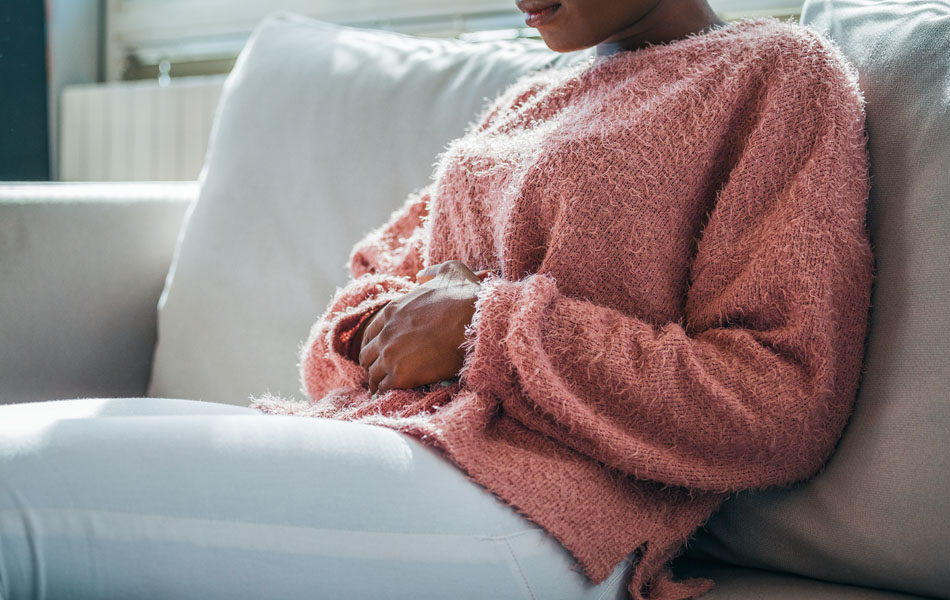Can IBS Cause Back Pain? Lifestyle Tips for Pain Relief
Irritable bowel syndrome (IBS) symptoms don’t always occur in your digestive system. This article examines the link between irritable bowel syndrome and back pain and offers some lifestyle tips for pain relief.

Irritable bowel syndrome is associated with many symptoms in the digestive system. However, it can also cause fatigue, difficulty urinating, and back pain.
People with IBS can be overly sensitive to pain and often report symptoms that are not obviously associated with the condition. For example, while gastrointestinal pain is one of the most common signs of irritable bowel syndrome, IBS back pain is experienced by many people.
This article delves into the link between IBS and back pain, discusses the causes of it, and offers four lifestyle interventions to help relieve your IBS back pain.
Can IBS Cause Back Pain?
Yes, IBS can cause back pain. Gastrointestinal symptoms such as abdominal pain, bloating, and diarrhea are the most common signs of IBS. However, back pain is also reported by numerous people who have been diagnosed with the condition.
When pain signals are crossed in the central nervous system, referred pain from the intestines can be felt in other body parts, including the back. It can also result from muscle pain caused by stronger contractions associated with bowel movement.
IBS pain can be debilitating. Pain treatment can include medication, but diet, exercise, stress reduction, and other alternative therapies can help you manage the pain and continue with your normal daily activities.
What Is IBS?
Irritable bowel syndrome is a gastrointestinal condition unrelated to structural, functional, or biochemical abnormalities. It is diagnosed by first ruling out other gastrointestinal disorders, such as inflammatory bowel disease or colon cancer.
The diagnostic criteria for irritable bowel syndrome include recurrent abdominal pain for at least 3 days per month for the previous 3 months, as well as improvement in pain after a bowel movement, a change in the frequency of bowel movements, or a change in the consistency of your stool.
Physical symptoms vary from person to person, and 4 subtypes of IBS have been identified based on your symptoms. For example, you may have IBS with constipation, diarrhea, or a combination of constipation and diarrhea. The fourth category is undefined, as your symptoms don’t match the other criteria.
Pain, constipation, and diarrhea are the primary symptoms of IBS, but other symptoms are also common. They include acid reflux, bloating, flatulence, mucus in your stool, an urgent need to go to the toilet, difficulty passing urine, fatigue, and back pain.
People with IBS frequently feel pain more intensely than others because their pain receptors are more sensitive. Increased pain sensitivity can result in IBS pain not being restricted to the digestive tract and presenting as lower back pain, headaches, and muscle aches.
What are the causes of IBS?
Until recently, irritable bowel syndrome was thought to result from altered pain sensitivity and changes in the contractions that move food through the intestines. However, this doesn’t account for the range of symptoms experienced by IBS patients.
Scientists are investigating other causes of IBS, including infection, an imbalance in neurotransmitters such as serotonin, overgrowth of bacteria in the small intestine, the two-way communication between the gut and the brain, and genetics.
Food sensitivities have also been linked to IBS symptoms. For example, some people with IBS find that chocolate causes constipation or coffee causes bloating. However, it’s more common for foods high in fermentable carbohydrates such as sucrose and fructose to cause abdominal discomfort.
IBS is a complex interplay between the immune system, central nervous system, and the gut microbiome, and the link between stress and IBS is well known. Studies have shown that psychological stress can increase pain sensitivity, gut contractions, mucus secretion, and gut lining permeability.
What Does IBS Back Pain Feel Like?
IBS back pain is often described as the strong pressure in your lower back. It happens because irritable bowel syndrome creates excess pressure in one’s digestive tract.
If constipation is your most prominent symptom, it may result in lower back pain due to the distension of the colon, putting pressure on the nerves in your back. In addition, inflammation and a build-up of gas in the colon can cause similar pain.
Chronic pain is a symptom of other health conditions that commonly occur concurrently with IBS, including fibromyalgia and rheumatoid arthritis. However, IBS back pain flares up simultaneously with your other IBS symptoms.
IBS pain location in women
Symptoms of IBS in women involve the digestive tract, where bloating, nausea, and constipation are common, as well as symptoms in other parts of the body. In addition, women are more likely to experience back pain, as well as pain-related comorbidities, than men.
Research shows that women’s abdominal pain intensifies before and during their menstrual cycle, with increased pain sensitivity caused by changes in estrogen and progesterone levels.
What Is the Treatment for IBS Pain? 4 Options to Relieve It
There are numerous treatment options for IBS pain, including medication or lifestyle changes. However, for long-term relief from chronic pain, you must reduce stress and identify complementary treatments that address the underlying causes of your IBS.
These are our top 4 tips for managing IBS pain:
#1 Increase your fiber intake
Increasing your fiber intake can improve your IBS symptoms. The two most important functions of fiber in the digestive tract are adding bulk to your stool and softening it by holding water, making it easier to pass.
The best way to consume fiber is through fiber-rich foods such as whole grains, fruit, and vegetables. However, if you struggle to meet your fiber requirements of 28g daily, you can use a fiber supplement.
These supplements contain dietary fiber that adds bulk to your stool and is a recognized treatment for IBS. Consuming a fiber supplement before or after a meal twice a day can help you manage constipation and bloating associated with IBS.
#2 Try yoga or pilates
The regular practice of yoga and pilates has been shown to ease the symptoms of IBS. In addition, increasing your physical activity can improve gastrointestinal transit time, help clear gas from the gut of patients with bloating, and has been shown to increase gut microbiome diversity.
Yoga is a form of exercise that focuses on mindfulness, breathing, and stretching and is beneficial for people to reduce stress. Such psychological benefits can result in an improvement of your irritable bowel symptoms.
For people who have IBS with constipation, yoga poses can massage your internal organs and help ease constipation. They also gently stretch the muscles, which may be causing back pain.
#3 Learn what you can and can’t eat
Many people are sensitive to foods that contain fermentable oligosaccharides, disaccharides, monosaccharides, and polyols, commonly referred to as FODMAPs, and following a low FODMAP diet can be an effective treatment for their irritable bowel syndrome.
Alcohol, caffeine, spicy foods, fatty meals, refined wheat products, and milk and dairy products are commonly avoided by people who experience symptoms of IBS. However, the type and amount of food that causes IBS symptoms differs between patients, so your IBS diet must be personalized.
High-fiber foods can be problematic for some people, especially if they consume too much dietary fiber and insufficient soluble fiber, the type of fiber found in products and supplements such as ColonBroom. It’s also crucial to increase your water intake when you increase how much fiber you consume.
#4 Drink tea
Herbal teas such as peppermint, chamomile, and fennel can soothe bloating and other digestive issues, including irritable bowel syndrome. In addition, research proves that they can help reduce bloating and intestinal pain.
Certain teas can also help ease constipation. For example, black, green, senna, and aloe vera tea can stimulate contractions in the digestive system, making it easier to have a bowel movement.
Note that caffeine can irritate the gut, and if you have diarrhea-dominant IBS, it can worsen your symptoms. It is, therefore, better to choose caffeine-free herbal teas instead of black or green tea.
How to Overcome Back Pain When Trying to Sleep
Overcoming back pain when trying to sleep begins before you go to bed. First, you must establish a healthy sleep routine that includes a warm, relaxing bath, gentle stretches, and eating your last meal at least three hours before bed.
Turning off all electronic devices an hour before retiring, keeping your bedroom dark and at a comfortably cool temperature, and avoiding alcohol and caffeine later in the day contribute to a good night’s rest.
Back pain caused by irritable bowel syndrome can be challenging to overcome when trying to sleep. However, practicing yoga before bed and avoiding dinner-time trigger foods can make sleeping easier.
A Word From Our MD
Irritable bowel syndrome is usually associated with abdominal pain, bloating, flatulence, constipation, and diarrhea. However, many IBS patients are more sensitive to pain than others and may experience referred pain in other body parts.
Back pain is common in IBS patients and can be caused by constipation and bloating that results in the distention of the colon. It places pressure on the nerves in the back, causing referred pain.
Many people with an IBS diagnosis also have other conditions that may cause back pain. For example, comorbidities such as fibromyalgia, rheumatoid arthritis, and chronic pelvic pain are associated with chronic pain.
Conclusion
The answer is that IBS can cause back pain. If you have this condition, you probably also have increased pain sensitivity, so your back pain can be referred to as pain from the digestive tract, pressure on the nerves from an expanded colon, or the result of IBS comorbidities.
Numerous factors cause IBS, and the root cause is not the same for every patient. Therefore, it’s vital to identify what triggers your IBS so that you can take appropriate steps to overcome it.
Medication, combined with lifestyle factors and complementary treatments, can help ease your IBS symptoms and back pain and improve your quality of life.

















































 Select your language:
Select your language: 










